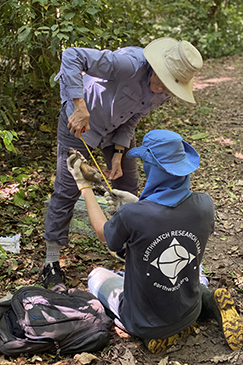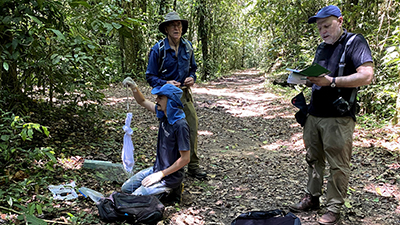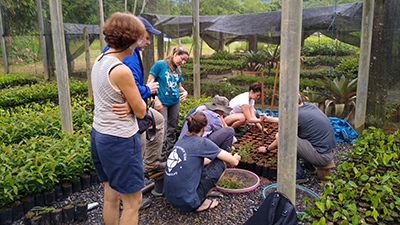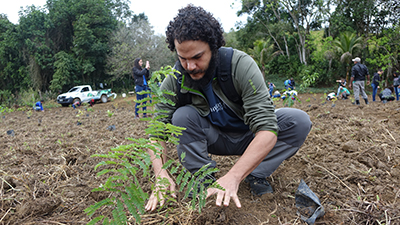プログラム調査日程・空き状況・参加費用等、海外調査に関するお問い合わせは、アースウォッチ・ジャパン事務局にて承ります。info@earthwatch.jp までお気軽にお問い合わせください。
Around the world, ecosystems are collapsing as trees are logged and forests disappear. Large-scale reforestation efforts aim to reverse this decline—but how successful are they?

The Serra dos Órgãos mountain range of Rio de Janeiro State creates an amazing landscape of spectacular ridges, valleys, and lowlands, stretching from magnificent mountain summits to mangrove forests on the coast. The Reserva Ecológica de Guapiaçu (REGUA) is nestled into the lowlands of these mountains, and is home to a unique wealth of biodiversity. REGUA houses at least 60 mammal species, including the elusive Southern Woolly Spider Monkey and the puma.
These breathtaking forested mountains and the unique animals that live within them are under incredible strain. Only 15% of the original forest still stands, and what does remain is very fragmented and disconnected. To combat this decline and to safeguard the area’s biodiversity, Brazil’s government, conservation organizations, and NGOs have invested in large-scale reforestation efforts. While these efforts are urgently needed, they should be based on strong scientific data to ensure that the way the area is reforested restores both species use and ecosystem services.
On this project, you will investigate small, medium, and large mammals in REGUA, from the common Southern Four-eyed Opossum to the rarely-seen puma. Using both live traps for small to medium animals and camera traps for larger animals, you will collect information about how the mammals of the reserve are responding to reforestation efforts. This project will actively contribute data to the management plan of REGUA, and will produce technical reports for reforestation decision makers. Additionally, you will aid in reforesting the reserve, helping to grow seedlings and planting them within the forest. Your time in the reserve is limited, but the trees you plant will be protected and may stand for decades to come.
ボランティアの役割
When you arrive, the researchers will conduct an orientation and provide you with information on the areas you will be studying. Field work includes some of the following tasks:

CONDUCT MAMMAL SURVEYS
You will install camera traps and live traps, check the traps, handle and process small mammals (optional), collect and clean traps, and enter the data collected.

You will mark trees and plots on reforestation banks and take field measurements of trees and their conditions, including: stand density, canopy coverage, and assess tree growth rates.

You will aid in reforesting the Atlantic Forest area by harvesting seeds from the forest, processing seeds, organizing the nursery by species, and planting tree seedlings (only during the rainy season).
